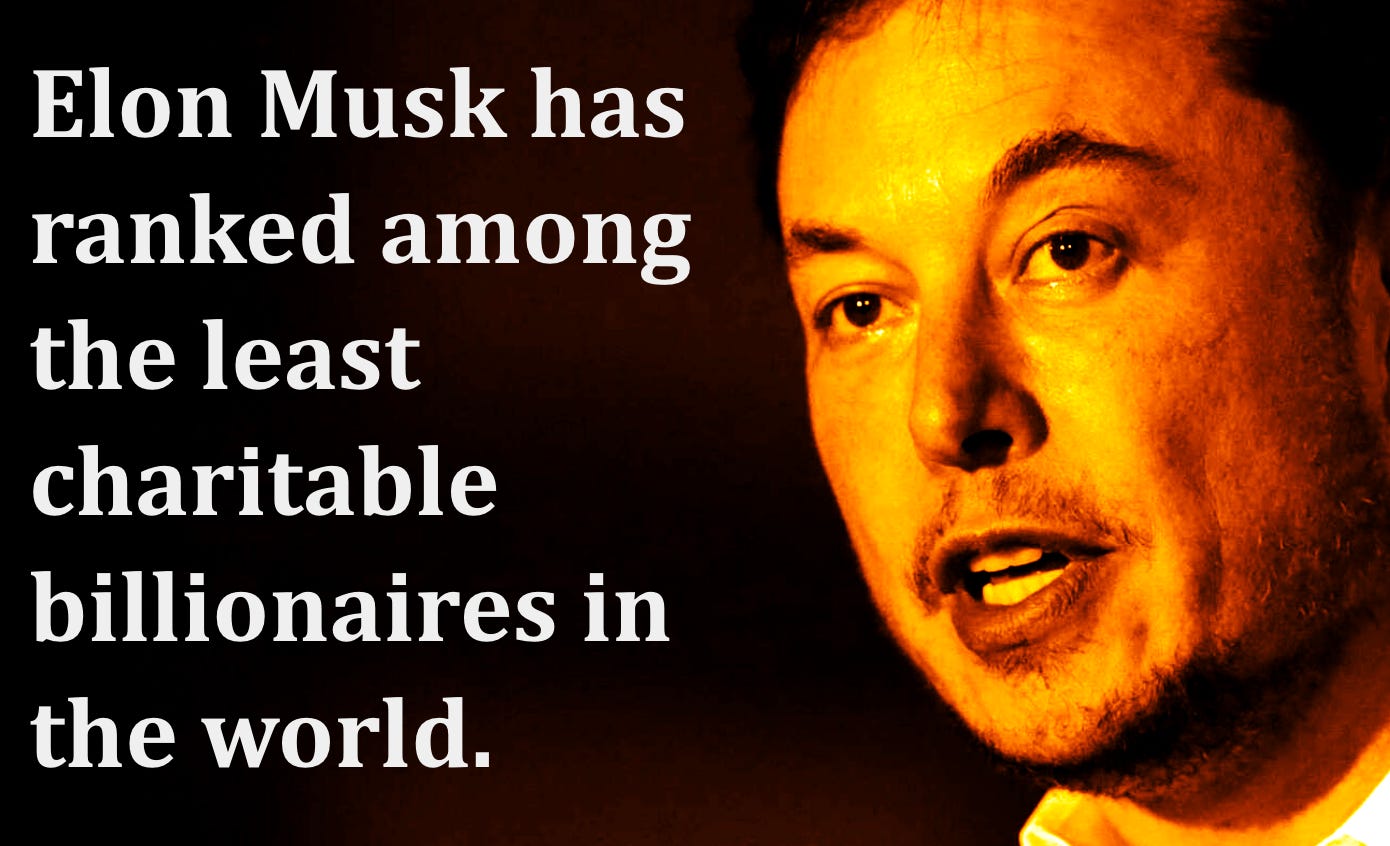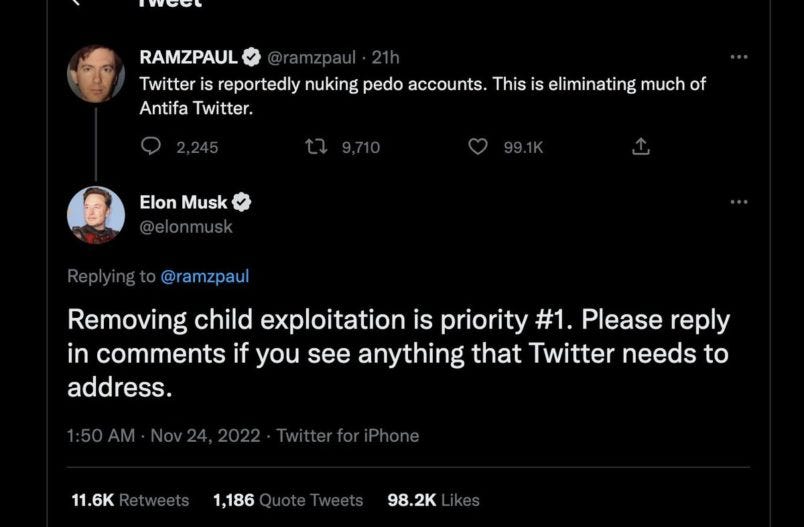Elon Musk - the Troll of Philanthropy
Was Musk's descent into vicious xenophobia on Twitter foreshadowed by his open disdain for philanthropy and improving society?
The (most likely former) world’s richest man, Elon Musk, is busily destroying Twitter by turning the service over to hateful xenophobic trolls and bots in what he claims is the pursuit of “free speech.” But of course, Musk has actually been revealing the speech he values more than the company he acquired - anti-Semitism, anti-LGBTQ, anti-Black, anti-feminist voices. White nationalists. Now busily flooding Twitter on the basis of Musk’s disgusting Amnesty of Hate, a program to allow the world’s most infamous bigots another chance at the Twitter microphone.
At Talking Points Memo (worth the subscription) Josh Marshall has been chronicling Musk’s descent into madness on Twitter:
Just in recent days he’s begun promoting explicitly white nationalist content too. Indeed, the two often meld together. Here he is, for instance, just yesterday.
This tableau requires some translation. “Ramzpaul” is Paul Ray Ramsey, a notorious white nationalist. Here Ramsey casually equates left-wingers with pedophiles and Elon replies validating the slur and saying Twitter is on the case.
Will this debasement devalue Tesla? It already has. Will it curtail SpaceX’s ambitions? No doubt. Will it end with Musk as a global pariah as this gross extremist moment eventually washes back from the sea from its scummy high tide mark? I certainly hope so.
But I’d like to surface another Musk story here, from my own area of professional work - his peculiar phantom philanthropy. As the World’s Richest Man™ (not really but certainly up there), you might expect Elon Musk to also be among the world’s busiest philanthropists, expending some percentage of his capital to pitch to solving the world’s most pressing problems. Strangely enough, that’s not the case.
As a philanthropist, Elon Musk basically does not exist.
Well, except as a massive troll who acts like a stoned frat boy even with so many worthy causes in the world.
Last year, Musk tweeted that if the UN World Food Programme could tell him - Elon freaking Musk, World’s Richest Man™ - how it planned to “solve world hunger,” he’d donate $6 billion to help it along.

And lo and behold! A couple of months later, an FEC filing showed that Musk transferred 5.7 million shares of Tesla (worth about $6B at the time) to “a charity.” So world hunger, here we come, right? The World’s Richest Man™ was finally stepping up! Lives would surely be saved.
Heh heh, yeah right. If you’ve been following Musk’s disgraceful behavior at Twitter (and frankly, his history of extreme libertarianism and labor exploitation) you will not be shocked to learn that the WFP received not a nickel from Uncle Elon. Nor did any other public charities report a significant windfall from Team Musk.
Forbes writer Eliza Haverstock was on the case, and her explanation is clearly the most likely.
What makes a lot more sense is that the money landed in a donor-advised fund (DAF), which behaves like a philanthropic bank account. DAFs are essentially black boxes, since they don’t carry specific requirements like annual distributions or public disclosures of grants tied to a specific donor. Money can sit in DAFs for years without ever going to an operating nonprofit group, which is why Forbes does not count such funds when measuring the biggest philanthropists—unless the billionaire shares details about grants actually made by their DAF, as a representative for Musk has done in the past. Of the $280 million that Forbes estimates Musk has given to charity over his lifetime (without this latest mega-gift), about 20% has been donated through DAFs.
One of the advantages of giving stock to a DAF is that Musk receives the tax benefit of the gift—a tax deduction of as much as 30% of his 2021 adjusted gross income—as soon as he makes the donation, even though the shares are sitting in the equivalent of a philanthropic holding tank.
A second scenario is that Musk could have pumped the money into his own foundation instead. In that case, he’d still receive an immediate income tax deduction. But, unlike a gift directly to a DAF, foundations are required to disperse about 5% of assets annually. (If the foundation distributes more than 5% in one year, it can carry forward the excess for five years. If the percentage is not met, the foundation simply pays more in taxes).
Ah, so Musk most likely still controls the funds even as he realizes a massive tax break. As Haverstock noted: “Up until now, at least, Musk has ranked among the less charitable billionaires in the world, especially relative to the size of his fortune.”
His one public commitment is to the XPrize, a contest for entrepreneurs working on decarbonization projects and competing for the Musk dollars; he’s committed $100 million to the prize, though no money has apparently been distributed yet. Also, no word on his companies may profit from the ideas he’ll have exclusive access to.
That said, many charities are very interested in Musk’s latest moves, indeed.
Here’s the Human Rights Campaign ripping Musk’s decision to let violent bigots back on Twitter.
And here’s Anti-Defamation League CEO Jonathan Greenblatt on Musk’s cozy relationship with brutal anti-Semitism in his company.
And here’s the Center for Countering Digital Hate analyzing the rapid rise in hate speech on Musk’s new Twitter platform.
And here’s a statement by NAACP President Derrick Johnson on Musk’s plan to let former President Trump spin hate speech on Twitter.
So yes, nonprofits and the philanthropy world are indeed in interested in Musk’s belly rub of hate groups.
All of which Elon Musk rejects in trollish fashion, laughing at concerns that the hatred he condones - and apparently admires personally - is dangerous. That’s Elon Musk, the Troll of Philanthropy.





